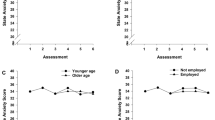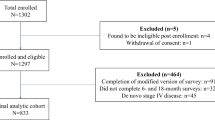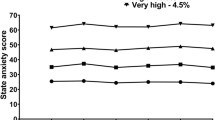Abstract
This study examined the long-term trajectory patterns of anxiety in breast cancer survivors and identified its predicting variables, especially the type of coping profile. Eighty-one patients who completed all four questionnaires from the 10-year study were included in the analysis. Anxiety scores from the Hospital Anxiety and Depression Scale were used in latent class growth analysis to chart the anxiety trajectory of cancer survivors. Demographic variables, clinical variables, depression level, and coping profiles (adaptive versus maladaptive) were used as predictors. Our study identified a two-class model of long-term anxiety trajectory among breast cancer survivors, with a resistant group (85.2%) and a distress group (14.8%). Demographic and clinical variables were not associated with anxiety trajectory paths. On the other hand, maladaptive coping characterized by higher scores in helplessness/hopelessness, cognitive avoidance, and anxious preoccupation, and lower scores in fighting spirit and fatalism in the Mini-MAC was a significant predictor of distressed anxiety. Coping profiles identified using the Mini-MAC were predictive of long-term anxiety trajectory among breast cancer survivors in our survey. Early interventions on coping with cancer could reduce long-term anxiety problems.


Similar content being viewed by others
Data availability
Research data are not shared due to privacy and ethical restrictions.
References
World Health Organization (2018) Latest global cancer data: cancer burden rises to 18.1 million new cases and 9.6 million cancer deaths in 2018. https://www.who.int/cancer/PRGlobocanFinal.pdf. Accessed 12/30/2019 2019
Mitchell AJ, Ferguson DW, Gill J, Paul J, Symonds P (2013) Depression and anxiety in long-term cancer survivors compared with spouses and healthy controls: a systematic review and meta-analysis. Lancet Oncol 14(8):721–732. https://doi.org/10.1016/S1470-2045(13)70244-4
Koch L, Jansen L, Herrmann A, Stegmaier C, Holleczek B, Singer S, Brenner H, Arndt V (2013) Quality of life in long-term breast cancer survivors - a 10-year longitudinal population-based study. Acta Oncol (Stockholm, Sweden) 52(6):1119–1128. https://doi.org/10.3109/0284186x.2013.774461
Global Burden of Disease Cancer C, Fitzmaurice C, Allen C, Barber RM, Barregard L, Bhutta ZA, Brenner H, Dicker DJ, Chimed-Orchir O, Dandona R, Dandona L, Fleming T, Forouzanfar MH, Hancock J, Hay RJ, Hunter-Merrill R, Huynh C, Hosgood HD, Johnson CO, Jonas JB, Khubchandani J, Kumar GA, Kutz M, Lan Q, Larson HJ, Liang X, Lim SS, Lopez AD, MacIntyre MF, Marczak L, Marquez N, Mokdad AH, Pinho C, Pourmalek F, Salomon JA, Sanabria JR, Sandar L, Sartorius B, Schwartz SM, Shackelford KA, Shibuya K, Stanaway J, Steiner C, Sun J, Takahashi K, Vollset SE, Vos T, Wagner JA, Wang H, Westerman R, Zeeb H, Zoeckler L, Abd-Allah F, Ahmed MB, Alabed S, Alam NK, Aldhahri SF, Alem G, Alemayohu MA, Ali R, Al-Raddadi R, Amare A, Amoako Y, Artaman A, Asayesh H, Atnafu N, Awasthi A, Saleem HB, Barac A, Bedi N, Bensenor I, Berhane A, Bernabe E, Betsu B, Binagwaho A, Boneya D, Campos-Nonato I, Castaneda-Orjuela C, Catala-Lopez F, Chiang P, Chibueze C, Chitheer A, Choi JY, Cowie B, Damtew S, das Neves J, Dey S, Dharmaratne S, Dhillon P, Ding E, Driscoll T, Ekwueme D, Endries AY, Farvid M, Farzadfar F, Fernandes J, Fischer F, TT GH, Gebru A, Gopalani S, Hailu A, Horino M, Horita N, Husseini A, Huybrechts I, Inoue M, Islami F, Jakovljevic M, James S, Javanbakht M, Jee SH, Kasaeian A, Kedir MS, Khader YS, Khang YH, Kim D, Leigh J, Linn S, Lunevicius R, El Razek HMA, Malekzadeh R, Malta DC, Marcenes W, Markos D, Melaku YA, Meles KG, Mendoza W, Mengiste DT, Meretoja TJ, Miller TR, Mohammad KA, Mohammadi A, Mohammed S, Moradi-Lakeh M, Nagel G, Nand D, Le Nguyen Q, Nolte S, Ogbo FA, Oladimeji KE, Oren E, Pa M, Park EK, Pereira DM, Plass D, Qorbani M, Radfar A, Rafay A, Rahman M, Rana SM, Soreide K, Satpathy M, Sawhney M, Sepanlou SG, Shaikh MA, She J, Shiue I, Shore HR, Shrime MG, So S, Soneji S, Stathopoulou V, Stroumpoulis K, Sufiyan MB, Sykes BL, Tabares-Seisdedos R, Tadese F, Tedla BA, Tessema GA, Thakur JS, Tran BX, Ukwaja KN, Uzochukwu BSC, Vlassov VV, Weiderpass E, Wubshet Terefe M, Yebyo HG, Yimam HH, Yonemoto N, Younis MZ, Yu C, Zaidi Z, Zaki MES, Zenebe ZM, Murray CJL, Naghavi M (2017) Global, regional, and national cancer incidence, mortality, years of life lost, years lived with disability, and disability-adjusted life-years for 32 cancer groups, 1990 to 2015: a systematic analysis for the global burden of disease study. JAMA Oncol 3(4):524–548. https://doi.org/10.1001/jamaoncol.2016.5688
National Research Council (2004) Meeting psychosocial needs of women with breast cancer. National Academies Press
Linden W, Vodermaier A, Mackenzie R, Greig D (2012) Anxiety and depression after cancer diagnosis: prevalence rates by cancer type, gender, and age. J Affect Disord 141(2-3):343–351. https://doi.org/10.1016/j.jad.2012.03.025
Brandenbarg D, Maass S, Geerse OP, Stegmann ME, Handberg C, Schroevers MJ, Duijts SFA (2019) A systematic review on the prevalence of symptoms of depression, anxiety and distress in long-term cancer survivors: Implications for primary care. Eur J Cancer Care (Engl) 28(3):e13086. https://doi.org/10.1111/ecc.13086
Zeynalova N, Schimpf S, Setter C, Yahiaoui-Doktor M, Zeynalova S, Lordick F, Loeffler M, Hinz A (2019) The association between an anxiety disorder and cancer in medical history. J Affect Disord 246:640–642. https://doi.org/10.1016/j.jad.2018.12.019
Greer JA, Solis JM, Temel JS, Lennes IT, Prigerson HG, Maciejewski PK, Pirl WF (2011) Anxiety disorders in long-term survivors of adult cancers. Psychosomatics 52(5):417–423. https://doi.org/10.1016/j.psym.2011.01.014
Burgess C, Cornelius V, Love S, Graham J, Richards M, Ramirez A (2005) Depression and anxiety in women with early breast cancer: five year observational cohort study. BMJ 330(7493):702. https://doi.org/10.1136/bmj.38343.670868.D3
Kornblith AB, Herndon JE 2nd, Weiss RB, Zhang C, Zuckerman EL, Rosenberg S, Mertz M, Payne D, Jane Massie M, Holland JF, Wingate P, Norton L, Holland JC (2003) Long-term adjustment of survivors of early-stage breast carcinoma, 20 years after adjuvant chemotherapy. Cancer 98(4):679–689. https://doi.org/10.1002/cncr.11531
Lam WW, Bonanno GA, Mancini AD, Ho S, Chan M, Hung WK, Or A, Fielding R (2010) Trajectories of psychological distress among Chinese women diagnosed with breast cancer. Psychooncology 19(10):1044–1051. https://doi.org/10.1002/pon.1658
Bidstrup PE, Christensen J, Mertz BG, Rottmann N, Dalton SO, Johansen C (2015) Trajectories of distress, anxiety, and depression among women with breast cancer: looking beyond the mean. Acta Oncol (Stockholm, Sweden) 54(5):789–796. https://doi.org/10.3109/0284186X.2014.1002571
Henselmans I, Helgeson VS, Seltman H, de Vries J, Sanderman R, Ranchor AV (2010) Identification and prediction of distress trajectories in the first year after a breast cancer diagnosis. Health Psychol 29(2):160–168. https://doi.org/10.1037/a0017806
Saboonchi F, Petersson LM, Wennman-Larsen A, Alexanderson K, Vaez M (2015) Trajectories of anxiety among women with breast cancer: a proxy for adjustment from acute to transitional survivorship. J Psychosoc Oncol 33(6):603–619. https://doi.org/10.1080/07347332.2015.1082165
Ho SM, Ho JW, Bonanno GA, Chu AT, Chan EM (2010) Hopefulness predicts resilience after hereditary colorectal cancer genetic testing: a prospective outcome trajectories study. BMC Cancer 10:279. https://doi.org/10.1186/1471-2407-10-279
Saphner T, Tormey DC, Gray R (1996) Annual hazard rates of recurrence for breast cancer after primary therapy. J Clin Oncol 14(10):2738–2746. https://doi.org/10.1200/jco.1996.14.10.2738
Baker F, Denniston M, Smith T, West MM (2005) Adult cancer survivors: how are they faring? Cancer 104(S11):2565–2576
Watson M, Greer S, Young J, Inayat Q, Burgess C, Robertson B (1988) Development of a questionnaire measure of adjustment to cancer: the MAC scale. Psychol Med 18(1):203–209. https://doi.org/10.1017/s0033291700002026
Watson M, Law MG, Md S, Greer S, Baruch J, Bliss J (1994) The Mini-MAC: further development of the mental adjustment to cancer scale. J Psychosoc Oncol 12(3):33–46
Greer S, Moorey S, Watson M (1989) Patients' adjustment to cancer: the Mental Adjustment to Cancer (MAC) scale vs clinical ratings. J Psychosom Res 33(3):373–377. https://doi.org/10.1016/0022-3999(89)90027-5
Gilbar O, Or-Han K, Plivazky N (2005) Mental adjustment, coping strategies, and psychological distress among end-stage renal disease patients. J Psychosom Res 58(6):471–476. https://doi.org/10.1016/j.jpsychores.2005.01.004
Andreu Y, Galdon MJ, Dura E, Martinez P, Perez S, Murgui S (2012) A longitudinal study of psychosocial distress in breast cancer: prevalence and risk factors. Psychol Health 27(1):72–87. https://doi.org/10.1080/08870446.2010.542814
Johansson M, Ryden A, Finizia C (2011) Mental adjustment to cancer and its relation to anxiety, depression, HRQL and survival in patients with laryngeal cancer - a longitudinal study. BMC Cancer 11:283. https://doi.org/10.1186/1471-2407-11-283
Tojal C, Costa R (2015) Depressive symptoms and mental adjustment in women with breast cancer. Psychooncology 24(9):1060–1065. https://doi.org/10.1002/pon.3765
Wang WT, Tu PC, Liu TJ, Yeh DC, Hsu WY (2013) Mental adjustment at different phases in breast cancer trajectory: re-examination of factor structure of the Mini-MAC and its correlation with distress. Psycho-oncology 22(4):768–774
Cheng CT, Ho SMY, Liu WK, Hou YC, Lim LC, Gao SY, Chang WY, Wang GL (2019) Cancer-coping profile predicts long-term psychological functions and quality of life in cancer survivors. Support Care Cancer 27(3):933–941. https://doi.org/10.1007/s00520-018-4382-z
Ho SM, Fung WK, Chan CL, Watson M, Tsui YK (2003) Psychometric properties of the Chinese version of the Mini-Mental Adjustment to Cancer (MINI-MAC) scale. Psychooncology 12(6):547–556. https://doi.org/10.1002/pon.672
Leung CM, Ho S, Kan CS, Hung CH, Chen CN (1993) Evaluation of the Chinese version of the Hospital Anxiety and Depression Scale. A cross-cultural perspective. Int J Psychosom 40(1-4):29–34
Zigmond AS, Snaith RP (1983) The hospital anxiety and depression scale. Acta Psychiatr Scand 67(6):361–370. https://doi.org/10.1111/j.1600-0447.1983.tb09716.x
Wang GL, Hsu SH, Feng AC, Chiu CY, Shen JF, Lin YJ, Cheng CC (2011) The HADS and the DT for screening psychosocial distress of cancer patients in Taiwan. Psychooncology 20(6):639–646. https://doi.org/10.1002/pon.1952
Collins LM, Lanza ST (2010) Latent class and latent transition analysis : with applications in the social, behavioral, and health sciences. Wiley, Hoboken
Jung T, Wickrama K (2008) An introduction to latent class growth analysis and growth mixture modeling. Soc Personal Psychol Compass 2(1):302–317
Nylund KL, Asparouhov T, Muthén BO (2007) Deciding on the number of classes in latent class analysis and growth mixture modeling: a Monte Carlo simulation study. Struct Equ Model Multidiscip J 14(4):535–569. https://doi.org/10.1080/10705510701575396
Bonanno GA, Ho SM, Chan JC, Kwong RS, Cheung CK, Wong CP, Wong VC (2008) Psychological resilience and dysfunction among hospitalized survivors of the SARS epidemic in Hong Kong: a latent class approach. Health Psychol 27(5):659–667. https://doi.org/10.1037/0278-6133.27.5.659
Porter LS, Keefe FJ, Garst J, Baucom DH, McBride CM, McKee DC, Sutton L, Carson K, Knowles V, Rumble M, Scipio C (2011) Caregiver-assisted coping skills training for lung cancer: results of a randomized clinical trial. J Pain Symptom Manag 41(1):1–13. https://doi.org/10.1016/j.jpainsymman.2010.04.014
Owen JE, O'Carroll Bantum E, Pagano IS, Stanton A (2017) Randomized trial of a social networking intervention for cancer-related distress. Ann Behav Med 51(5):661–672. https://doi.org/10.1007/s12160-017-9890-4
Judge Santacroce S, Asmus K, Kadan-Lottick N, Grey M (2010) Feasibility and preliminary outcomes from a pilot study of coping skills training for adolescent--young adult survivors of childhood cancer and their parents. J Pediatr Oncol Nurs 27(1):10–20. https://doi.org/10.1177/1043454209340325
Kalter J, Verdonck-De Leeuw IM, Sweegers MG, Aaronson NK, Jacobsen PB, Newton RU, Courneya KS, Aitken JF, Armes J, Arving C, Boersma LJ, Braamse AMJ, Brandberg Y, Chambers SK, Dekker J, Ell K, Ferguson RJ, Gielissen MFM, Glimelius B, Goedendorp MM, Graves KD, Heiney SP, Horne R, Hunter MS, Johansson B, Kimman ML, Knoop H, Meneses K, Northouse LL, Oldenburg HS, Prins JB, Savard J, Beurden M, Berg SW, Brug J, Buffart LM (2018) Effects and moderators of psychosocial interventions on quality of life, and emotional and social function in patients with cancer: an individual patient data meta-analysis of 22 RCTs. vol 27. https://doi.org/10.1002/pon.4648
Moorey S, Greer S (2012) Oxford Guide to CBT for People with Cancer. Oxford University Press
Stark DP, House A (2000) Anxiety in cancer patients. Br J Cancer 83(10):1261–1267. https://doi.org/10.1054/bjoc.2000.1405
Author information
Authors and Affiliations
Corresponding author
Ethics declarations
Conflict of interest
The authors declare that they have no conflict of interest.
Additional information
Publisher’s note
Springer Nature remains neutral with regard to jurisdictional claims in published maps and institutional affiliations.
Rights and permissions
About this article
Cite this article
Cheng, CT., Ho, S.M., Lai, Y. et al. Coping profiles predict long-term anxiety trajectory in breast cancer survivors. Support Care Cancer 29, 4045–4053 (2021). https://doi.org/10.1007/s00520-020-05936-6
Received:
Accepted:
Published:
Issue Date:
DOI: https://doi.org/10.1007/s00520-020-05936-6




